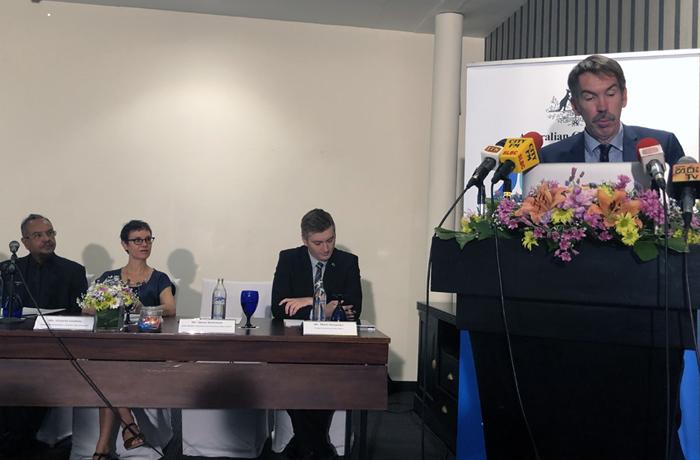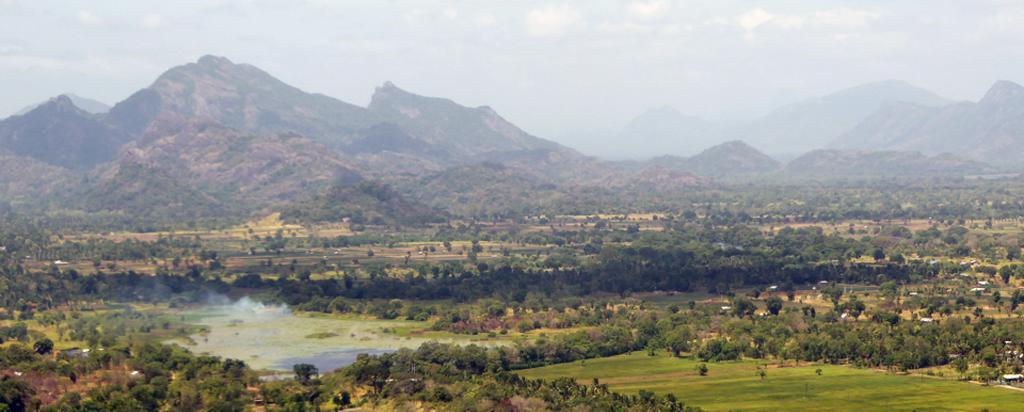

Published on the 1st April 2019 by ANSTO Staff
Chronic kidney disease of unknown cause (CKDu) may affect one in five people in some Sri Lankan districts and is linked to chronic kidney failure in vulnerable rural communities around the world.
The disease is endemic in Sri Lanka and has also been reported several Central American countries, the state of Andhra Pradesh in India and the El-Minia Governorate in Egypt.

(Left to right) Asela Iddawela, Project Director for the Sri Lankan Presidential Task Force; Victoria Coakley, Australian Deputy High Commissioner to Sri Lanka; Mark Alexander, International Affairs Manager ANSTO and Steve McIntosh. Senior Manager, Government and International Affairs, ANSTO
Today it has been confirmed that ANSTO will receive a funding boost of 58 million Sri Lankan rupees ($465,000 AUD) from the Australian High Commission in Colombo (DFAT) in support of research into CKDu.
This new funding will continue work set out in the MOU signed with the Presidential Taskforce for Prevention of Chronic Kidney Disease to fight CKDu, which was signed in May 2017.
In carrying out thiswork, ANSTO will work closely with both the Taskforce and the Renal Disease Prevention Unit, part of the Sri Lankan Ministry of Health, Nutrition and Indigenous Medicine.
ANSTO technologies, like the Australian Synchrotron's x-ray fluorescence microprobe (XFM) in Melbourne and the large accelerators at Centre for Accelerator Science as well as instruments at the Australian Centre for Neutron Scattering in Sydney are being used to study both environmental and tissue samples.
Australian researchers and scientists have used ANSTO capabilities to investigate a number of the possible contributors to the development and distribution of CKDu, particularly in relation to drinking water quality and drinking water management, and disease progression and treatment.
The new funding will help ANSTO to continue this important Australian contribution to the work, and
specifically to:
- establish a baseline for normal kidney function in Sri Lanka;
- study nutritional transfer and environmental exposure;
- complete a comprehensive study of drinking water from domestic wells in CKDu-affected communities; and
- contribute to the training and development of Sri Lankan students and early career researchers.
CEO of ANSTO, Dr Adi Paterson, said the funding comes at a key point in ANSTO’s research into CKDu.
“This new funding is critical in our continued investigations into better understanding the causes and potential solutions for this chronic health issue which is threatening Sri Lankan communities,” Dr Paterson
said.
“Using our unique capabilities in environmental isotope tracing here at ANSTO, researchers have examined the existing hypotheses and, importantly, expanded the approach into an in-depth understanding of the potential risk factors for the disease.
“Thanks to this new funding, we will now be able to continue this important work and use of techniques, such as advanced X-ray imaging and accelerator science approaches.”
Ms Victoria Coakley, Deputy High Commissioner, echoed the sentiment of Dr Paterson in saying that she hoped the additional funding would lead to a reduction in the number of new CKDu patients.
“We are proud to back this partnership with ANSTO and the Sri Lankan Presidential Taskforce to help address this disease which is severely impacting the health and wellbeing of many Sri Lankans,” Ms Coakley said.
“We have confidence that Australian experts and ANSTO’s world-class technology will be able to provide insights or even solutions for those living with, or at risk of developing this currently incurable illness.”
While CKDu appears to disproportionally affect poor, rural, male farmers in hot climates, the reasons why are not yet clear.
The World Health Organisation has identified several potential contributing factors, including heavy metals in the groundwater, agrochemicals, heat stress, malnutrition and low birth weight, and a number of infectious pathogens.
Mr Asela Iddawela, Project Director for the Sri Lankan Presidential Task Force, welcomed the research and ongoing support from Australia.
“The Presidential Task Force for the Prevention of Chronic Kidney Disease is highly appreciative to the Government of Australia for the commitment and support extended to us to solve the burning health issue of Chronic Kidney Disease of Uncertain Aetiology. We hope that this endeavour will immensely contribute towards finding the root course of the disease thereby arriving at a lasting solution for the disease.”
“We are grateful for the new round of funding approved by the Australian Government.”
Dr Sunil De Alwais Additional Secretary - Medical Services, Ministry of Health, Nutrition and Indigenous Medicine similarly looks forward to continuing to work with ANSTO on this project.
“We are grateful to ANSTO for agreeing to conduct joint research work into CKDu with the Renal Disease Prevention and Research Unit of the Ministry of Health and anticipate signing a data sharing agreement shortly, to commence research activities in April 2019. We also convey our gratitude to the Department of Foreign Affairs and Trade for contributing over 58 million rupees for CKDu studies over the next two years.”
Media enquiries, please email media@ansto.gov.au